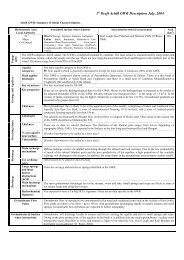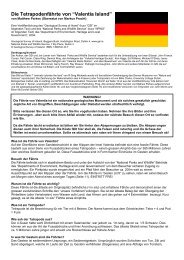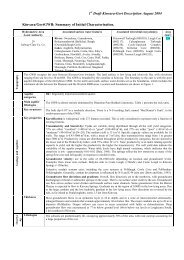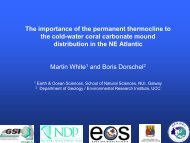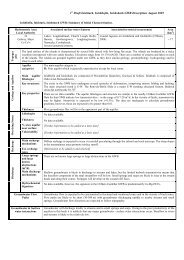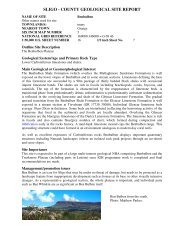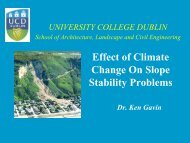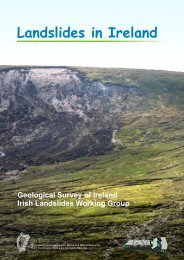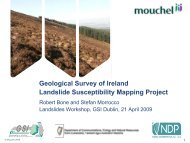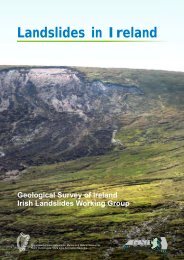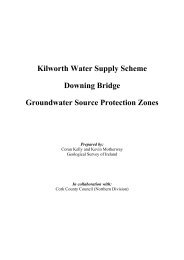PDF Download (2.6Mb) - Geological Survey of Ireland
PDF Download (2.6Mb) - Geological Survey of Ireland
PDF Download (2.6Mb) - Geological Survey of Ireland
You also want an ePaper? Increase the reach of your titles
YUMPU automatically turns print PDFs into web optimized ePapers that Google loves.
What a Geopark is not:<br />
A Geopark is not an area <strong>of</strong> outstanding<br />
geological heritage alone; other facets<br />
<strong>of</strong> heritage (natural, cultural, historical,<br />
archaeological) must also be integrated<br />
as they’re all interlinked.<br />
A Geopark is not a single site either<br />
(Geoparks are territories large enough so<br />
development strategy can be emplaced).<br />
A Geopark is not an area fenced <strong>of</strong>f just<br />
for scientists and it is not a theme park<br />
either.<br />
A Geopark is not a formal, legislative<br />
designation. And, as such, it carries no<br />
legal obligations or restrictions. However<br />
because <strong>of</strong> the nature <strong>of</strong> conservation<br />
activities taking place in Geoparks, these<br />
territories and/or their collaborating<br />
partners are likely to be involved with<br />
policy making.<br />
Why is the concept becoming<br />
popular?<br />
Geoparks aim to protect geological<br />
heritage and geodiversity within national<br />
frameworks. Geoparks aim at promoting<br />
understanding <strong>of</strong> Earth history and<br />
legacy through education. Geoparks<br />
aim at supporting economic growth<br />
and sustainable development through<br />
geotourism. Geoparks aim at reconnecting<br />
people with Planet Earth.<br />
As Geoparks operate within a network,<br />
whether at a European level or a Global<br />
level, they are provided with a platform for<br />
exchange <strong>of</strong> knowledge and best practice.<br />
All territories have different geological<br />
heritage and communities but they are all<br />
driven by the same will to make it work:<br />
conserve geological heritage for the future<br />
generations, educate and develop in a<br />
sustainable and responsible way for the<br />
benefit <strong>of</strong> all.<br />
Access to the Network is achieved through<br />
a very selective process where applicants<br />
are asked to demonstrate that they are<br />
operating as a “de-facto” Geopark, i.e. a<br />
Geopark in everything but name, which<br />
also insures the quality <strong>of</strong> the applicants.<br />
Are there any Geoparks in<br />
<strong>Ireland</strong>?<br />
In 2000, Marble Arch Caves, in Co.<br />
Fermanagh and the Copper Coast, in Co.<br />
Waterford applied to join the EGN and<br />
were successfully accepted. To date they<br />
remain the only <strong>of</strong>ficial members <strong>of</strong> the<br />
EGN on the island <strong>of</strong> <strong>Ireland</strong>.<br />
Through successful applications to EU<br />
funding programmes, Marble Arch Caves<br />
Geology Matters: Winter 2009<br />
Marble Arch Caves Global Geopark,<br />
Co. Fermanagh and Co. Cavan<br />
and Copper Coast raised a considerable<br />
amount <strong>of</strong> funds to further develop<br />
themselves as territories, along with<br />
infrastructure, signage, staff, educational<br />
services and products, promotional<br />
resources, tourism products and raise<br />
awareness <strong>of</strong> the Geopark concept. Both<br />
territories became Global Geoparks in<br />
2004. Marble Arch Caves Global Geopark<br />
has since successfully extended to Co.<br />
Cavan in 2008, thus becoming the first<br />
international Geopark in the world.<br />
Copper Coast<br />
Global Geopark,<br />
Ballydwane,<br />
Co. Waterford<br />
page 7 page 7



